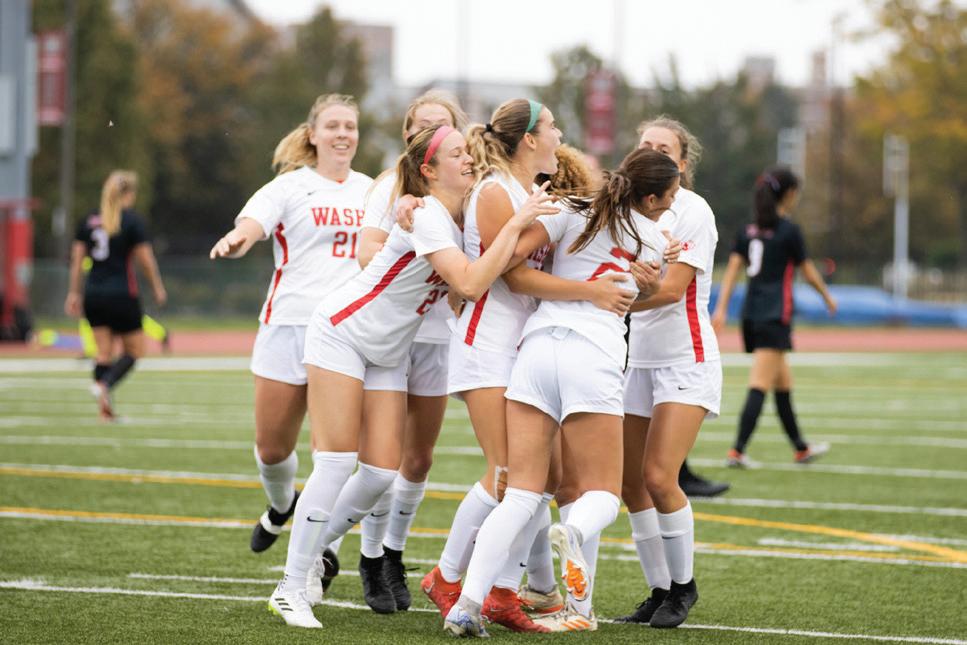










448 voters were surveyed after casting their ballot. These are their responses:
91%
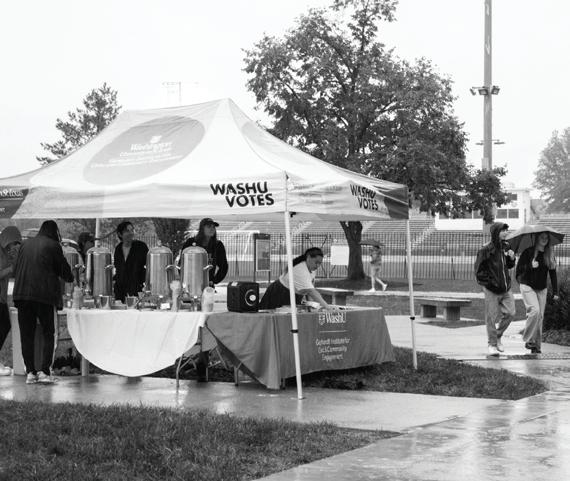






probably an irrational level of optimism going in [to election night].”
MANAGING NEWS EDITOR
After president-elect Donald Trump secured a decisive victory in the presidential election on Tuesday night, many WashU students came to campus the next day grappling with the news and processing a wide range of emotions.
For some, Wednesday was a celebration of a strong showing by Trump. But for many students on WashU’s predominantly Democratic campus, the day was marked by sadness, fear, and uncertainty about the future of the country.
Katie Pope — a senior from California studying Psychology, Spanish, and Marketing — said she felt devastated by the election results.
“I actually went to bed early hoping I’d wake up for good news, because I just couldn’t handle it,” Pope said. “I woke up, and it was definitely not what I’d hoped for. It definitely gave me a pit in my stomach.”
Senior David Cui — a Computer Science and Math major from California — voted for Donald Trump, in alignment with his parents’ political preferences. He noted that his parents had examined each candidates’ policies more thoroughly than he had, and they ultimately decided that Trump’s policies would be better for their family.
“My dad’s a businessman and he used to be a rice farmer in China. Some of the policies that Kamala was fighting for would really devastate my dad’s business,” he said. He also noted that if he was financially independent, he likely would have voted for whichever candidate benefited his financial interests, while also weighing issues like environmental policy, gun control, and education.
Cui said he felt mostly indifferent upon hearing of the election results this morning.
“I feel a little more pleased that I think the new president can hopefully improve our nation,” he said. “I don’t know. We’ll see.”
Senior Elie Weitzman, a Political Science and History major from New York, was surprised that Donald Trump won the election by such a large margin.
“Watching all the early results come in and see Michigan and Pennsylvania swinging far more red than I thought they were gonna be was jarring,” Weitzman said. “I felt
Although the final vote count has not been reported yet, as of Wednesday night, Trump has over 72 million votes compared to Vice President Kamala Harris’ 68 million, per the New York Times. Polling data prior to the election showed Trump and Harris in a dead heat.
Senior Ethan Holz said the election results showed him that living in a largely Democratic area had limited his perception of American politics.
“My reaction is like, wow, I have such little understanding of so many people,” Holz said. “Because I was just like, how is Donald Trump winning? I’m living in some sort of bubble where I can’t relate to so many people, and I just feel bad about that.”
Throughout the day, Holz found himself enjoying class discussions that feel like a departure from the doom and gloom that has permeated campus.
“Something externally is happening in the world, [but] there’s still so many things that I can do that affect my well being and how I feel,” Holz said. “It sucks. But it happened, it is the reality, and I’m not really willing to walk around sullen for days or weeks.”
Senior Aarav Dubey, who is originally from India but has also lived in California and Georgia, said he did not vote because he didn’t want to support any candidate who “supports the cruelties occuring in Palestine.”
Dubey also expressed frustration with the Electoral College.
“The system feels unfair because unless you’re in a swing state, your influence on policy is severely compromised,” he said.
Similar to Holz, Dubey was struck by just how differently people viewed the outcome of the election.
“Some people think this means the end of the world, and some people think that democracy just got saved,” Dubey said.
Dubey said that following the 2016 election he “gave up on politics” and that he does not feel extremely impacted by the outcome of the 2024 election.
“I feel a little bad because people seem very influenced by it, so clearly it matters,” Dubey said. “I just think we overestimate how much influence we have on national politics and underestimate the huge impact we can have on the people around us locally, just by being a nice person and being in tune with local causes.
So I think we should focus on little
steps like that.”
In response to student reactions, some professors made the decision to cancel classes to give students the space to process their varied reactions to the election outcome.
Lucas Drummond, a lecturer at the Sam Fox School, knew he wanted to cancel his Wednesday class, no matter the outcome.
“I canceled my class prior to the election last week, knowing that regardless of the result it would be a valuable time for space and reflection,” Drummond wrote.
Professor of Biological Anthropology David Strait, who teaches Human Evolution, made his class optional and uploaded his lecture in advance.
“My reasoning was simply that I knew that elections can be stressful and also that some students would want to stay up late to watch the returns,” Strait wrote. “I told students about the video before we knew who the winner was.”
After an emotional night watching the election results roll in, Wolfram Schmidgen, a professor of English, found himself asking if he should teach class.
“This morning I thought, am I going to even go in? I mean, am I going to teach?” Schmidgen said.
“But I felt like it would actually be more important for me to be there with [students] to talk about this, rather than stay away and avoid conversation.”
Schmidgen led a conversation in class to connect the outcome of the election to literature. He remembers other times in his career when he made similar decisions to bring current events into the fold rather than shy away from them.
“I remember teaching a Jane Austen class and it was the day that we attacked Iraq,” he said. “I felt that day too that I couldn’t just teach Jane Austen, so I walked in and actually talked about war and whether Jane Austen is, in fact, a kind of escape from that.”
Going into class on Wednesday, Schmidgen admitted that he was nervous because the election is a sensitive topic, acknowledging that there may have been Trump voters in the room.
“I also didn’t know whether there would be willingness among students to take the courageous step to actually talk about it,” he said, noting that students actively participated in the conversation. “I was surprised by how emotional I was, but I just wanted to open it up.”
Voted yes on Amendment 3 to repeal the abortion ban
6 %
Voted no on Amendment 3 to repeal the abortion ban
46 %
Voted yes on Amendment 2 to legalize sports gambling
47%
Voted no on Amendment 2 to legalize sports gambling
In an exit poll conducted by Student Life, 448 voters at the WashU Athletic Complex overwhelmingly supported Democrats, including Kamala Harris for President, Lucas Kunce for Senate, and Wesley Bell for the House of Representatives. Abortion was a key issue for a majority of voters, and more than 90% of respondents supported Amendment 3, which would enshrine reproductive rights in the state’s constitution. However, respondents were split on Amendment 2, which would legalize sports gambling.
For 13 hours on Tuesday, Nov. 5, Student Life surveyed 448 voters after they voted in the 2024 general election. According to Stephanie Kurtzman — Executive Director of the Gephardt Institute for Civic and Community Engagement — 1,600 voters cast their ballots or provisional ballots at the Athletic Complex, an increase from 949 in 2022 and 1,156 in 2020.
85.5% of the poll’s respondents were WashU students. Survey respondents were majority female (64.7% female, 32.9% male). 67.3% of respondents were white, 22.6% were Asian, 11% were Hispanic, and 9.6% were Black.
74.7% of respondents identified as Democrats, while 16.6% said they were Independents, and 5.6% identified as Republicans. 88.8% of voters voted for Harris, 6.7% voted for Donald Trump, and 2% voted for Green Party candidate Jill Stein. 89.5% voted for Democrat Lucas Kunce over Republican incumbent Josh Hawley for Senate, 87.2% of respondents picked Democrat Crystal Quade over Republican Mike Kehoe for Governor, and 86.8% picked Democrat Elad Gross over Republican incumbent Andrew Bailey for Attorney General.
The Associated Press called the presidential election for Donald Trump on Wednesday afternoon. Democrats Kunce, Quade and Gross also lost their elections.
82.6% of respondents preferred Democrat Wesley Bell in the race
for the House, while 7.6% picked Republican Andrew Jones Jr., and 3.1% picked Don Fitz of the Green Party. The Associated Press called the race for Bell on Wednesday. Missouri’s election has also received attention for its amendments and propositions. Amendment 3 is overwhelmingly popular among respondents, as 91.3% said they voted yes, and it passed with Missouri voters. Abortion was deemed the most impactful issue, with 50.8% of respondents selecting it as the issue they cared most about. Other important issues were healthcare (9.4%), the economy (8.9%), racial and ethnic equality (6.7%), and climate change (4.9%).
While respondents overwhelmingly voted for Amendment 3, they were split on Amendment 2, voting slightly in opposition to legalizing sports gambling. 46.1% of voters voted to legalize sports gambling in the state, 47% voted against the amendment, and 6.9% abstained from voting on the amendment. As of Wednesday night, the Associated Press has not called this race.
A majority of respondents also indicated that they would vote “No” on Amendments 6 and 7. 69.4% said they would vote “No” on Amendment 6, which would authorize usage of court fees for salaries and pensions of law enforcement personnel. Opponents of Amendment 6 say it would create a set of incentives that tie pensions to the number of arrests and prosecutions made.
72% of respondents chose “No” on Amendment 7, which would prohibit ranked-choice voting or approval voting in the state of Missouri. In addition, the amendment would explicitly prohibit non-citizens from voting in Missouri elections, something that is already prohibited by state law. Amendment 6 failed, while Amendment 7 passed.
Respondents overwhelmingly voted “Yes” on Proposition A, which would increase Missouri’s minimum wage to $15/hour by 2026 if passed. It would also require employers to provide one hour of paid sick leave for every 30 hours worked, and was passed by Missouri voters.
ZACH
ELIZABETH
INVESTIGATIVE
Amendment 3, which will enshrine a woman’s right to an abortion up until fetal viability in the Missouri Constitution, passed with margins of 51.6% to 48.4% on Nov. 5. The amendment, which also protects access to reproductive healthcare like birth control and prenatal care, will go into effect in 30 days.
Senior Maddy Molyneux, president of WashU’s chapter of Planned Parenthood Generation Action (PPGA) said that she was thrilled that the amendment passed and sees this as only the first step in the fight for reproductive rights.
“I am elated, excited, and I am also excited to get into the work ahead,” Molyneux said. “The fight has only just begun, and we have a lot of work ahead of us … with reopening clinics and things like that, but I’m excited to begin.”
PPGA is a WashU club, partnered with Planned Parenthood, that is dedicated to educating and fighting for reproductive justice. The group has been advocating for Amendment 3 since last spring, when they helped collect signatures to meet the required 172,000 signatures
Entitled the “Right to Reproductive Freedom Initiative,” the amendment reverses Missouri’s trigger abortion ban, the first to go into effect after Roe v. Wade was overturned by the Supreme Court decision on Dobbs v. Jackson Women’s Health Organization. Missouri has one of the strictest abortion bans in the nation because it lacks exceptions for rape and incest.
from registered Missourians needed to get the initiative on the ballot.
Molyneux mentioned that, while many may have been disappointed by national and state election results, Amendment 3 being passed was a positive part of their election night.
“I got the impression that a lot of people were clinging to this bright spot,” she said.
Many WashU students and faculty voted in support of the amendment, with 91.3% of the 448 voters who Student Life polled at the Athletic Complex voting in favor of it.
Junior Tully Jay said he supported Amendment 3 since he believes that women should have a right to regulate their own bodies.
“The government shouldn’t regulate what people do personally, [that is my] overarching philosophical idea,” Jay said. “Targeting abortion is a very specific attack
against women, which is also bad, which just compounds the badness of it.”
One student, who opposed Amendment 3 but wanted to remain anonymous out of fear of social retaliation, said they believe Missouri residents should be allowed to choose their stance on the issue.
“I am personally opposed to the provisions of the amendment and believe life begins at conception,” the anonymous student said. “I only support abortion access in cases of rape, incest, underage pregnancy, threat to the life or health of the mother, or a birth defect. However, I am in favor of abortion rights being left to the states, and if that’s what a majority of Missourians support, then so be it.”
Junior Leila Asadi said she was glad abortion rights were enshrined within the state, especially with president-elect
Donald Trump winning the presidency, leaving national abortion rights at risk.
“I think that this does go hand-in-hand with states’ rights,” Asadi said. “I know that’s not necessarily [something] people can agree on. But as long as we cement that there is the chance that states can have the right to abortion, then I think that can at least help a lot of women.”
Initially, Jay thought Amendment 3 would not meet the threshold necessary for it to pass, so he was surprised when it did.
“I was watching with my friends and because the Florida one [failed and] came up first [despite having] 57% yes. We were all confused, but Florida has a 60% law for amendments. We looked it up and it said Missouri had the same law. So Missouri was at like, 51% we were like, ‘oh, it’s done.’”
Jay then realized Missouri
has a threshold of 50%, rather than 60%, and he was excited to learn the amendment did pass. Some students, like Asadi, said they were glad that the government is no longer able to dictate what she sees as personal choice.
“I feel like the government shouldn’t be policing what people do with their own bodies,” Asadi said. “I think laws are meant to keep people safe and also to help create a more civil and orderly society, so just kind of telling people what procedures they can and can’t get, and also telling them how they should live their life [isn’t right].”
Asadi views the passage of the amendment as a point of hope, especially given the political climate of Missouri.
“I think it provides a little bit of hope [because] a state as red as Missouri is able to protect the rights of women,” Asadi said.
JOEL SWIRNOFF NEWS EDITOR
Over the summer of 2024, then-rising-junior Kayleigh Hernandez was confronted with a notification that shocked her: She had an outstanding balance of $50,000 owed to WashU. As a first-generation, low-income (FGLI) student, Hernandez normally paid a greatly reduced tuition that ranged in the hundreds of dollars.
The year before, Hernandez had attempted to take a medical leave of absence during the fall semester of her sophomore year after experiencing a severe seizure, but she missed the deadline, which also resulted in her failing her classes. She was able to secure a medical leave of absence for the following semester — which meant she didn’t have to pay tuition for it.
Hernandez had assumed that she did not need to reapply for financial aid each year as a student, believing instead that all four years of tuition were covered from one financial aid application.
The $50,000 fee resulted from those two issues — if Hernandez had been able to successfully apply for a medical leave of absence during the first semester of her sophomore year, she would not have had to pay tuition at all. Additionally, if she had re-applied for financial aid, her fee would have been mostly covered, due to her low-income status.
“I didn’t realize that this debt had accumulated. When I realized it was real, I was crushed,” Hernandez said.
As it stands, Hernandez is unable to return to the University due to the outstanding balance incurred for the semester in which she had to return home due to her medical issues. She started a GoFundMe to help pay the fee, but it has only reached 6% of her goal.
Coming into college, Hernandez said that she was determined to chase her dream to graduate. However, she began experiencing roadblocks soon after she got to school in the fall of 2022.
In spring 2023, as a freshman, she began experiencing seizures of an unclear cause.
A close friend of hers also passed away around that time.
“At the time, they were the
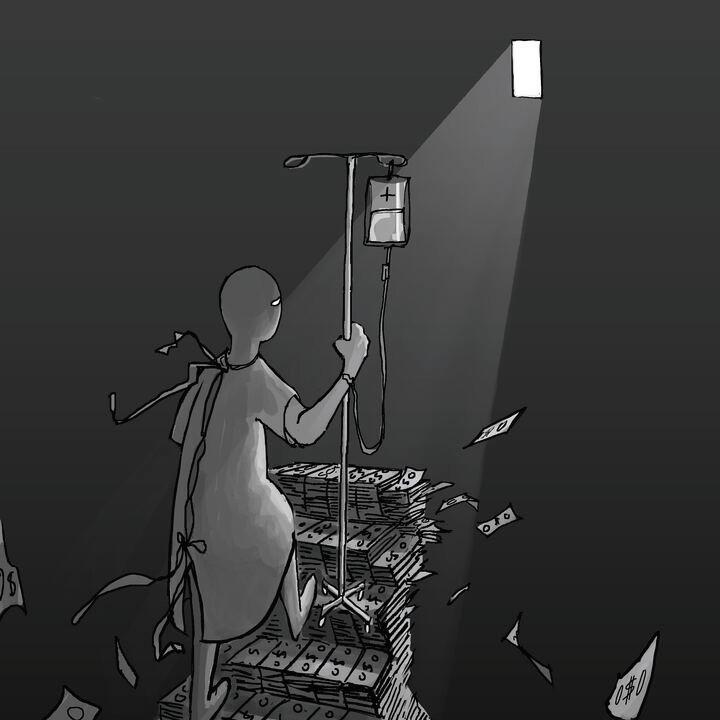
only person I cared about,” Hernandez said about her friend. “I was heading towards a bad place, and I felt powerless to stop.”
The issues she was facing would soon compound. After going home to Florida over the summer after her first year, Hernandez was confronted with feelings of shame when she was told by loved ones that leaving for college meant she was abandoning them.
Hernandez began performing poorly in her classes upon her return to school in fall 2023, the start of her sophomore year. Her seizures did not stop, and she contracted COVID-19. She wasn’t sure what to do about her medical conditions and assumed she would not be able to afford care.
“I wasn’t a bad student, but I was going through bad things,” Hernandez said.
In November of 2023, during dinner at Bear’s Den, Hernandez experienced a severe seizure that hospitalized her, which led to her deciding to return home. She said she was “unable to complete [a medical leave of absence] in time” for the fall 2023 semester, which resulted in her failing her classes.
Hernandez was able to obtain a medical leave of absence for the spring 2024 semester and began focusing on recuperating mentally and physically so that she could
return in fall 2024.
Hernandez would then learn of the $50,000 fee for the fall 2023 semester over the summer. The University notified her that, because she missed the deadline for the CSS Profile and FAFSA forms — both of which govern the allocation of financial aid — she had the fee charged to her account.
According to Hernandez, Student Financial Services (SFS) said things were “out of their hands.”
“I thought that I was covered through all four years,” Hernandez said. “Lots of first-generation college students don’t know this stuff.”
To take care of her fee, Hernandez said that she had secured a personal loan, but that the loaner backed out after she had returned to school upon reinstatement for the fall 2024 semester.
“When I was reinstated, I felt hopeful again, and I was ready to move forward,” Hernandez said.
Hernandez explained she was frustrated over being reinstated to the University in the fall of 2024 as her fee would prevent her from taking any classes once she got there.
“What’s weird is, if they knew that I hadn’t applied for the FAFSA, why did they let me return for classes in the fall?” Hernandez said.
Upon her return, she was unable to register for courses due to her outstanding debt.
As a result, she was told on Sept. 4, 2024 that she was being evicted from WashU housing.
Mike Runiewicz, Assistant Vice Provost and Director of Student Financial Services, said that many low-income students do have their full cost of attendance covered by the University, but that they must reapply each year by completing their financial aid forms again.
“[Students] have to do a new aid application every year,” Runiewicz said. “So we get new aid applications each year, but we’re committed to that same financial assistance level every single year.”
Two weeks after her notice, Hernandez was evicted from University housing, and she returned to Florida. She continued to reach out to numerous University representatives — including her academic advisor, multiple SFS directors, WashU Cares, Student Accounting, and a Director of Residential Life. She also reached out to the Association of Latin American Students (ALAS).
Junior Natalia León Díaz, Social Justice Lead for ALAS, said that ALAS felt they had a responsibility to help Hernandez.
“She hadn’t received any direction, any guide, any idea of where she could actually receive help and what she could do,” León Díaz said.
“We decided to work with her personally and guide her through the entire process as leaders, but also as friends and as people that share her background.”
León Díaz said that Hernandez deserves sympathy for her situation, especially given her background.
“I think it’s very easy to look at Kayleigh’s situation from a pseudo-objective perspective and blame her for being unable to submit her FAFSA and CSS forms on time,” León Díaz said. “But for someone that is firstgeneration, meaning that her parents and the people around her have not navigated an elite institution like WashU, it’s not so obvious.”
ALAS held a fundraiser on Nov. 2 in which some of the proceeds were sent to Hernandez, and the rest were sent to a nonprofit. ALAS has also helped her work through the process of discussing her case with administrators and University financial aid representatives.
León Díaz expressed concern towards how the University helps low-income students.
“We’re not in any way calling out WashU for its attempt in increasing the number of first-generation, low-income students,” León Díaz said.
“But with the acceptances of these students, there also has to be resources and employees that can deal with the baggage that comes from being from an underserved community.”
Runiewicz said that some issues stem from the fact that the University has to charge tuition if financial forms, like the FAFSA and CSS Profile, are not filled out. He added that forms are considered valid even if filled out late.
“There’s not something to ensure that tuition is being covered in the interim,” Runiewicz said. “We don’t have a way to not charge tuition, until [students] apply for aid.”
Hernandez said that her forms were not accepted when she filled them out late.
She also said that she felt the University had a responsibility to inform her that her financial aid was not being applied and that her forms were due.
“I don’t get why they wouldn’t have my counselor reach out to me,
telling me that I need to fill out my financial aid forms,” Hernandez said. “I wish there was better communication on their part, because now I’m suffering.”
Runiewicz said that SFS reaches out regularly to students to remind them of financial aid deadlines.
“We remind students in advance,” Runiewicz said. “As deadlines pass, we will continue reminding students as long as they remain enrolled.”
Hernandez said that she had seen emails sent by SFS, but that she believed they were not relevant to her under the assumption that her tuition was fully covered.
Julie Flory — Vice Chancellor for Marketing & Communications — said that while the University cannot comment on specific students, students are able to go to SFS for assistance.
“Any student who has concerns about their financial situation, including completing forms or paying fees, should contact Student Financial Services,” Flory said. “At WashU, we’re 100% committed to helping all our students succeed throughout their entire WashU experience, regardless of their background.”
Hernandez said that she plans on returning to the University if she is able to, and that she hopes the GoFundMe she set up can help her pay her debt.
Hernandez added that she remains in contact with representatives from the University, including those in WashU Cares, which is an office that appoints case managers to help students navigate a variety of situations, including for financial issues.
Hernandez said that she still feels some resentment about her situation.
“I feel almost ashamed, even if I am allowed to come back next semester,” she said. “I wish [the administration] would have a little bit of sympathy for me and let me back in.”
Hernandez said that it is critical to her that she returns.
“I need this degree, because without it I am hopeless,” she said. “I’ve gone through so much, and I really just want to be a good student.”
Additional reporting by Zach Trabitz, Investigative News Editor, and Aliza Lubitz, News Editor

meant we didn’t wait at all. If anything, BD seemed a bit desolate.
When WashU responded to the cries of hungry students with a new “All You Care to Eat” program in Bear’s Den (BD), two investigative journalists hunkered down in a booth and got to the bottom of it. The bottom of the piles of food on our many plates, that is.
That’s how we found ourselves sitting under the blue BD lights on a Friday evening, catfish, chocolate cake, and tuna salad sandwiches piled up in front of us.
Let’s rewind a bit to when we wandered into BD, which had transformed into a utopia for grubby little goblins such as us. It was like a Harry Potter feast scene.
On a typical day, the first step of BD’s All You Care to Eat (AYCTE) program is to stand in line and wait to receive a meal card. Luckily for us, arriving before 6 p.m.
In another moment of good luck, we quickly realized we had arrived on an AYCTE deal day. We paid $10.99 instead of the usual $14.99, making the meal comparable to or less expensive than a typical meal on campus.
As we wandered into the food area, we saw that the usual food stations had turned into grab-and-go, with seemingly no limit on how much you could take — except for the fruit, of which you are limited to two pieces.
There also seemed to be no limit on how many plates you could take; it’s possible that we broke a rule by taking 2-3 plates each. In fact, by the end of our experience, we were frustrated with having too much food to hold.
The options are vast: On the Friday we went, it ranged from fruit to pasta
to catfish to pizza and more. No longer do you have to plan your portions in accordance with your meal-points budget — by the end of your walk of shame through BD, you will definitely have enough food.
As we walked from station to station, the options themselves didn’t seem too different from the typical BD menu: pasta, salad, kosher and halal options, pizza, etc. There was the addition of a dessert table, though.
The system — partially self-serve, partially not — worked easily for us, but because of the free reign that students have, we can definitely see it getting a bit chaotic when more people are there.
After we loaded our plates full of as many types of food as we could –- to really get a broad understanding of the food choices — we made it to the booth. The food itself was, overall, decent. (Zach felt that his apple was okay:

“It was a bit mealy. The tuna fish sandwich was good.”)
The desire for larger portions seems to be the impetus for the AYCTE program, along with an effort from Dining Services to experiment with different dining options. We’d say AYCTE satisfied these needs.
It is worth noting that we are both on the Apartment Meal Plan and meal-point deprived (feel free to donate meal points). If BD was not a country mile away from us, we would definitely be frequenting the AYCTE program more often.
So, there we were, full and satisfied after our swath of food had washed over us. We were ready for round two.
Actually, no we were not. We did not do round two because we were too full
from round one. Here is a vote of confidence from us, two chaps (well, chap and chapette) who love to eat: You get a ton of food here. The food itself was, unfortunately, not the best, but that is okay. It’s about as good as BD usually is. And we are sure they are still ironing out some kinks in the AYCTE system.
Since we are both upperclassmen who live off campus, it does not seem fair to fully weigh in on whether AYCTE is better for underclassmen who live on the 40. We will say, though, that the quantity of food you get in this system may make it more economically sound, especially with the deal they had going on, and even with their normal prices.
And we’re excited to see WashU try out a new dining program! We’ve watched,
over the past few years, as dining has changed, and we’ve learned that there will never be a time where every student is satisfied with their options.
Whether AYCTE becomes a permanent program at BD, spreads to other dining locations, or is obliterated from WashU forever, experimenting with options and responding to student needs for larger portions is a positive step forward for WashU dining. Will we be coming back to AYCTE? We’re pretty much out of meal points, so probably not. Would we recommend it to a 40-dweller? Sure! That’s partly because it’s the only option on weekdays, and partly because you’ll be satiated — and, most importantly, if you’re like us, you’ll probably have fun.
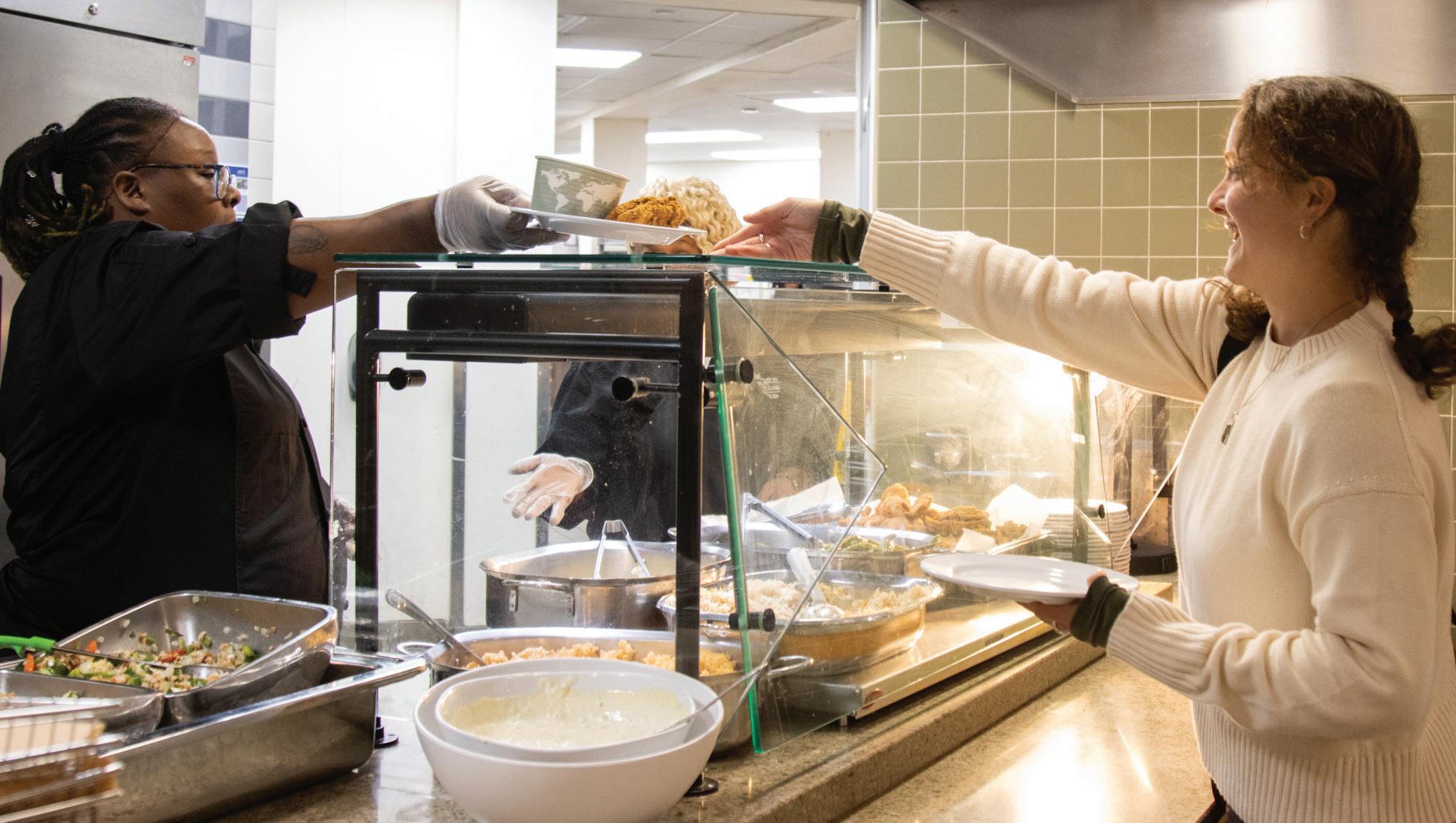

At 7:30 p.m. on election night, the WashU College Republicans met in a modern off-campus apartment on Washington Avenue to prepare for a night that would test their hopes and principles. About 20 students were there, creating a lively scene filled with chatter, laughter, and the familiar smell of pizza. Some sat cross-legged in front of a flat-screen TV tuned into the Red Eagle Politics YouTube livestream; others stood around the kitchen island, alternately chatting and refreshing the New York Times election page on their laptops. The mood was buoyant, with food, drinks, and bursts of humor punctuating the tense watch.
Senior Mason Letteau Stallings, president of WashU College Republicans, stood nearby and projected a confident but pragmatic outlook.
“It looks like there’s been a swing towards Trump in many areas that would indicate a win,” he said with measured excitement. “There was a slight swing towards him in some rural areas of North Carolina. He won [those areas in NC] in 2020 … so if he does 5% better, it’s going to be a win.”
Small groups formed and re-formed as students bounced from the living room to the kitchen island, analyzing the numbers and discussing strategy. Some grabbed slices from a rapidly diminishing stack of pizza boxes, while others hovered near their laptops, eyes darting between maps and color-coded predictions.
Senior and College Republicans treasurer, Josh Warner, noted the closeness of the race, but maintained hope.
“My thought process is at this point: it’s still anyone’s game. So far, most of the results have been somewhat predictable. He’s doing well where he needs to. She’s doing well where she needs to. It’s gonna be a long night, but hopefully a good one,” he said with a smile cracking through the tension.
By 8 p.m., the mood was hopeful, with tinges of nerves as more and more states began reporting. First-year Thomas McGowan had already assumed anxious anticipation.
“It’s crazy times we are in right now … [Trump] is up right now, but we still have the

entire left half of the country to call in,” he said, eyeing the maps on the screen before him anxiously. “I’m apprehensive, but I’m hopeful.”
Senior Joseph Sanok, however, was confident with no reservations.
“I don’t feel anxious or anything,” he said, matter-offactly and composed. “I really, really think that I always believed that Trump was going to win … I feel pretty confident.”
The energy in the room had shifted from focused, anticipatory energy to something more relaxed and festive.
Pizza boxes were piled high, emptied, and ordered repeatedly to fuel everyone well into the night. Conversations meandered from election analysis to weekend plans, but eyes darted back to screens often. The air was filled with camaraderie and anticipation, with the smell of food and the clinking of beer bottles adding to the atmosphere.
Graduate student Alden Filko weighed in, optimism clipping into his voice. He smiled, sitting back.
“It’s just that it appears as though all the smalltown votes are going for Republicans, so I’m hoping their voices finally get heard this election again,” he said.
Spirits were even higher at 9 p.m., with a wave of encouraging results. Clustered around laptops and the TV, students cheered as necessary battleground states seemed to cement for Trump.
McGowan announced updates with continual enthusiasm.
“Harris is at 99 [electoral votes]; Trump is at 198 right now … as of right now, it’s looking pretty good for Trump … The 80% reporting is killing me in Georgia, and
Trump’s up by five,” he said, his voice filled with anticipation. “So they’re gonna call it soon.”
With each new result, a high-five would erupt, and laughter burst around the room as students leaned into moments of celebration.
By 10 p.m., the night felt even more promising. Sanok had never been surer, his earlier confidence matching that now coming from his peers.
“I’m still very confident that Trump’s gonna win,” he said, beaming. “I just can’t see Kamala winning.”
The crowd agreed, and chatter of crucial swing states like Pennsylvania started to rise. McGowan, smiling, continued to highlight big development after big development.
“The big one is Trump is now up by 0.5% in Pennsylvania … As those votes are coming in and the middle counties are sending Trump up through the roof … I’m feeling pretty darn good right now,” he said.
As the results poured in across the TV, the room erupted, and for a moment, the apartment felt more like a victory rally than a watch party.
The final hours brought elated exhaustion. The room went from tense anticipation to celebration as results trickled in, and the outcome seemed inevitable. As the night ended and the result officially came through the TV, Letteau Stallings, who started the night cautious but optimistic, summed up the group’s glee.
“Everybody was jubilant and is looking forward to what Donald Trump is able to do,” he said.
Seven minutes past 7 p.m., a gaggle of students sporting “I Voted” stickers and camouflage print “Harris-Waltz” hats milled around Seigle 103, waiting for the WashU College Democrats election night watch party to commence. The nervous energy radiating off the group was palpable, cut briefly as WashU Democrats’ President, senior Saish Satyal, pushed through the crowd with a plentiful bounty of Domino’s pizza boxes stacked high in his arms. The watchers expected a night of community, come commiseration or celebration.
“I wasn’t expecting such a large turnout, but I’m very glad that I was here because I think I would have been extra stressed if I was alone … so we’re all in this together right now,” senior Doris Lamour said.
With a borrowed Peacock TV login and some closedcaption finagling, a triple-cam split between the broadcasts of NBC, MSNBC, and a live election map filled the screen. Satyal chalked a table of Pennsylvania election results on the blackboard. Students lined up in a neat queue for slices of pizza and halfheartedly pulled up rows of Macbooks for the veneer of studying. Tonight, though, these viewers had only one thing on their minds.
“I feel lowkey confident. I’ve been reading the news, and that doesn’t usually inspire, but if you don’t know what’s gonna happen, you might as well be confident, right? If both outcomes are equally likely, then there’s no point believing the one that you don’t like,” Satyal said as he buzzed around the board.
By 7:50 p.m., the first waves of flickering red started to
fill in the map. Although the room remained hopeful, it was hardly an inspiring sight. The idea of a group “guttural scream” out on Mudd Field was floated by senior Katie Hanson, a phrase aiming for jocular and landing on “uneasy.” Some of the Democrats, tongue-in-cheek, started leaning toward the superstitious. With one eye on the New York Times election needle prediction, Hanson jokingly started writing out a mantra for Vice President Kamala Harris’ win.
“What you do is you write the name of the target person. So in this case, [it’s] Kamala Harris, and then six times you write what you want to happen. So I’m saying ‘Kamala Harris will win the election’ six times,” Hanson explained, holding up a notebook of neatly printed lines.
“Oh, f–ck. It got worse,” Lamour interrupted, leaning over Hanson’s laptop to inspect the flickering needle on her screen, now reporting a 70% chance of victory for former president Donald Trump.
Others tried to keep their minds off the race. In the back of the room, junior Ariana Welsbie and senior Hanin Ghanam crocheted with spools of blue and green yarn. Welsbie, wearing a “Roe Roe Roe Your Boat” t-shirt, was working on the bottom of a sweater, while Ghanam made mini Grinches to sell on her Etsy shop. This was her third stress-relief creation of the night.
The abortion measure in Florida failed. Occasional calls from the Associated Press (AP) for races rung out across the room, breaking the conversation. Missouri was called for Trump, as were Texas, Ohio, and Nebraska, while Harris buffered a wall of blue
on the east coast. The wave of poll closings rolled across the country, and so started the long night of counting. As the numbers ticked upwards, the room grew tense in hushed wait. The Democrats had known the race would be tight, but now the numbers began to look less close and point to an obvious frontrunner instead. By 9 p.m., pizza long depleted and students petering out, the energy of the watch party waned enough to actually hear the jabber of the talking heads on the screen. Even the announcement of the passage of Missouri’s Amendment 3 drew only stiff silence.
“It feels like 2016 all over again,” Satyal said, head in his hands, original optimism long evaporated.
At 9:40 p.m., Trump took Iowa — significantly — crushing the few remaining glimmers of hope raised by the last-minute Selzer poll predicting a Harris upset. By 10 p.m., North Carolina had been called for Trump. Impromptu electoral maps were constructed, jigsaw puzzling and piecing together any potential path to a win for Harris. Swap Michigan for Arizona, forget Georgia … could the Democrats still win this? By midnight, the end was clear, with no map or mathematical configuration left to try. The race had skewed far, far from what the Democrats had anticipated, much less hoped for. At the end of the night, though, the College Democrats had turned their sights toward the silver lining woven into the state and local wins on progressive issues.
“It seems like everything is over, and to be honest, things are going to be incredibly tough in this country for the next few years. But in Missouri, Amendment 3 protecting abortion rights passed, and Proposition A, raising the minimum wage has (so far) garnered a strong majority of the vote,” Satyal wrote in a statement to Student Life. At the conclusion of a highly tumultuous and emotional campaign cycle, standing at the precipice of a new era for the country, Satyal urged WashU voters to fight for the future.
“It’s okay to be devastated about the election, and I personally think it’s a crime that we have to go to class on Wednesday. But I think that the success of [those amendments] shows that there’s still good work that can be done in harsh conditions and that, as hard as it may sound, maybe the start of another Trump presidency is the time to be more engaged than ever in organizing, campaigning, and issue advocacy,” Satyal wrote.
First time absentee voting: less fanfare, same impact
While some WashU students flocked to the red, white, and blue decked polling locations on Nov. 5, hundreds of others carried out their slightly-less-ceremonious ballot submissions through absentee voting in the preceding weeks. For many student voters, this election served as their first opportunity to cast a vote for their chosen presidential candidate, alongside the other nominees running in various local and congressional races. In one of the most contentious presidential races the United States has seen in decades, firsttime WashU voters sending their vote by mail expressed mixed feelings toward their absentee voter status.
First-year Alex Levy discussed his feelings on submitting his absentee ballot to his home state of Maryland.
“It wasn’t too exciting knowing I was voting in a state where the majority is already decided, because I didn’t feel as if I was contributing to something more,” Levy said.
Voters registered in swing states — such as Wisconsin, Pennsylvania, Michigan, and Georgia — held a powerful vote this election, as the precarious leanings of each state could potentially shift the country’s political climate. So, while Levy and other students hailing from traditionally blue or traditionally red states found their voting experience less impactful, others coming from mixed-party regions had a different perspective on the weight their individual vote carried.
Josh Greenberg, a firstyear from Philadelphia, Pennsylvania, shared his gratitude for absentee voting.
“Being from Pennsylvania, I feel like my vote becomes
even more important. I am not the most knowledgeable on this subject, but I did submit a mail-in ballot — something I’m especially grateful for in this election, as I wouldn’t have any say in the competitive Pennsylvania race without it,” Greenberg said.
One concern that some absentee voters expressed was their confusion with many of the ballot items.
“I didn’t know most of the names on the ballot … it was actually quite discouraging; I kept putting off filling out my ballot because I just didn’t know what half the stuff was,” Levy said.
Incomplete knowledge of the various nominees and measures listed on the ballot appeared to be a common theme amongst rookie voters.
First-year Isabel Cowart, another first-time voter who cast her ballot early and inperson in New York over
Fall Break, expressed similar concerns over her lack of familiarity with many of the ballot names.
“I called my mom with so many questions about which boxes to check,” Cowart said. Cowart also expressed that casting her ballot in-person was impactful, something she wasn’t sure would come across in the absentee voting experience.
“It felt exciting when I put my ballot in the box. I felt like I was making a difference, and I don’t know if someone would get that from an absentee ballot, because going to the Board of Elections was really empowering for me,” Cowart said.
First-year Miles LaTourretteGhez, a Los Angeles resident, explained his somewhat anticlimactic feeling about sending his vote in the mail.
“I knew filling out an absentee ballot wouldn’t be as exciting as voting at the polls,”
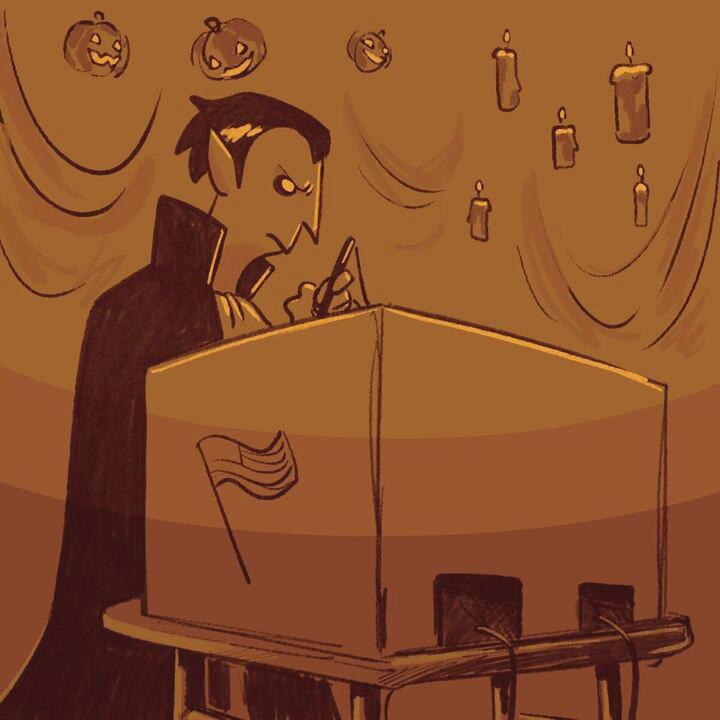
After reading Student Life’s Oct. 27 article on WashU’s drop in free speech rankings, I felt disappointed in our community. I’m not upset about our lower free speech rankings, though. I’m disappointed that people think that WashU is actively suppressing free speech. I’d argue that perceptions of limitations on freedom of expression are the result of a faulty narrative and a subsequent failure to take advantage of opportunities for free speech.
The particular ranking cited by this article was done by College Pulse — an organization that pays students to take short surveys about their opinions on campus issues.
College Pulse slightly adjusts scores based on the administration’s public statements that researchers have access to, but the three statistics cited by Student Life — administrative support, self-censorship, and comfort expressing ideas — are largely based on the perceptions of just 463 WashU student respondents. These rankings are not a reflection of absolute truth, but rather, the feelings of a subset of students.
When College Pulse emailed students to fill out their survey about free speech, I think it’s obvious that students who had been
involved in campus protests or had strong opinions on the University’s supposed suppression of free speech were the ones most likely to take interest in responding. Conversely, those who are indifferent to the topic or even supportive of the University are significantly less likely to feel motivated to share their thoughts.
So, I have no doubt that a large portion of the survey respondents were attendees or sympathizers of last year’s protests. The disproportionate response rate was exacerbated by groups like Resist WashU and Jewish Students for Palestine methodically characterizing the University’s response as a nefarious plot to prevent students from expressing their political opinions.
I write this in an attempt to challenge the popular narrative that people’s ability to express themselves is being actively suppressed on this campus.
At the time of publication, not a single student has been disciplined by the University only for expressing their opinions about the IsraelHamas war. Students have been disciplined for engaging in protests that happened to include expressions of support for Palestine. However, those protesters were explicitly disciplined for breaking clear University policies that prohibit encampments, using amplified noise, and
blocking the regular use of campus spaces. They weren’t disciplined for the views they expressed, but rather, the activities they chose to engage in while expressing them.
Numerous events involving political expression have occurred at WashU since Oct. 7 that followed University policy, and therefore, were allowed to continue without interference. The false claim that University discipline is a response to the protesters’ use of their free speech, rather than to their breaking of campus policies, is a damaging logical fallacy. This is a malicious attempt by groups like Resist WashU to obscure the matter, avoid punishment, and leverage the University to meet their demands. This narrative also misleads the greater student body who then further perpetuates it.
I write this article in hopes that the general student body will take a moment to reflect on the true state of the University and understand that the administration is not the obstacle towards our freedom of expression. The obstacle is us.
I went to a Dialogue Across Differences (DxD) event on Oct. 29 and was greatly disappointed in our student body. This particular event was the second of a two-part series, the first focusing on Islamophobia and the second

on antisemitism. There were ten people present. Eight were there on behalf of the DxD team. Only two came by choice: myself and the president of Student Union, senior Hussein Amuri.
There were 463 respondents to the free speech survey, and only two people showed up to an event explicitly geared towards facilitating absolute freedom of expression.
This is just one example of many opportunities the University has given us to freely express our thoughts on the war in Gaza. Many members of the administration have had personal meetings with numerous student leaders; they’ve held a town hall for affinity groups; and they’ve interfaced with SU on multiple occasions. They even posted
easels around campus with the Campus Demonstrations and Disruption Policies so that students could easily craft their protests to follow the University’s rules while still accomplishing their goals of political advocacy.
So, what’s our response to all these opportunities?
Protests that explicitly violate campus policies? Complaints about suppression of our First Amendment rights?
Resolutions that call for the resignation of the same Chancellor who teaches a free speech course and hosts discussions on free speech?
It’s up to us. Freedom of speech is alive and well at WashU. If we keep spreading the narrative that WashU is a place of suppression of expression, then yes, it will be a space
of uncomfortable silence. We, the student body, have both passively and actively created that perceived reality for ourselves.
The University has gone above and beyond in providing us with spaces and guidelines to express ourselves, so now it’s our responsibility to take advantage of those. If you are truly upset about a lack of opportunities to express yourself, you have to show up to events like DxD. Harnessing these opportunities to respectfully and openly dialogue with one another is the only way that we’ll truly embrace our First Amendment rights and foster a culture of mutual respect for each other’s shared values of human life, justice, and peace.



As many of us polled voters outside the Athletic Complex on Nov. 5, we witnessed a buzzing excitement. For lots of students, Tuesday was their first time voting. For others, it was their first time voting in an election that felt so highstakes. Students showed out in greater numbers than they have in the last several election cycles. 1,479 ballots were cast on the Danforth Campus in the Missouri 2024 election, compared to 949 in 2022. The WashU community felt empowered.
On Wednesday, the campus was somber.
Donald Trump was declared the winner of the 2024 presidential election on Nov. 6, and will be the 47th president of the United States. He won at least 295 electoral votes, 25 more than he needed, as well as the popular vote, making him the first Republican president to do so in the last two decades. Though we accept the results of the election, we do not accept the hateful and fear-mongering rhetoric that defined his campaign and former presidency, nor his criminal actions. WashU students, like the rest of the country, are grappling with these results and their implications.
According to our 2024 Election Issue survey of 696 students conducted last month, 84.7% of the student body planned to vote for Kamala Harris. Now, much of our community is grieving. And while our news feeds flood us with large, national statistics, the impact of the
election results are affecting us on a personal level, too. It is imperative that we, as a community, give people grace and space as they navigate what the election outcome means for their futures as well as our community’s future. We must recognize that these results hold different weight for different people and disproportionately impact women, LGBTQ+ people, and people of color. Take time to recognize your feelings, and then take time to recognize how others feel.
Prior to the election, our survey showed that 79.6% of the student body thought that Vice President Kamala Harris would win the election. This is understandable; the polls for swing states were extremely close and many people felt joy and hope about the Harris campaign. For many, realizing that the majority of people in the United States prefer Donald Trump to Kamala Harris was shocking and scary. This shock should bring all of us to question what media we are consuming and which narratives we are hearing. But we should also be critical of generalizing accusations following the election outcome.
People are looking to blame others for the election results. Doing this is convenient, as it takes the onus off of us to take action after this election. Yet, it is detrimental. Some are condemning specific demographics; others are belittling marginalized voters. This is divisive at best and racist at worst. We must avoid fingerpointing on this campus at all costs.
Although many of us live in this liberal bubble, we are also in a community of students with different opinions and ideas. Students voted in different states, for different candidates and propositions. Some students did not vote at all. As we look to break out of our bubbles, we should also look for support and form solidarity amongst the student body. This requires community, not division, as the incoming administration has shown us that its priorities lie in discrimination, injustice, and hate.
WashU, like most other majority-liberal universities, is a bubble; however, Missouri is not. Some of the communities most impacted by this year’s election results are just outside the gates of WashU, and stepping out of the campus ecosystem is a crucial step in enacting real change.
This election has shown us that, with effort, real change is accomplishable. Amendment 3 passed, enshrining the right to reproductive freedom in Missouri’s Constitution. Missouri was the first state to ban abortion after the Dobbs v. Jackson Women’s Health decision. Missouri also passed Proposition A, which will raise the state minimum wage to $15 an hour and guarantee paid sick leave to workers.
Victories that may seem small in the larger scale of the election results, like the repeal of Missouri’s abortion ban, took major grassroots organizing from groups in the St. Louis community — groups that you could be a part of. While you deserve a break

and the opportunity to grapple with Tuesday’s election results as you need, try not to feel like your actions don’t matter, because there are things you can do.
There are a multitude of St. Louis organizations who are putting in the work for causes and communities that may be threatened under the Trump administration. The Missouri Abortion Fund, the International Institute of St. Louis, Arch City Defenders, and STL Mutual Aid are all organizations you can get involved with in the local community.
Many of our strongest movements in this country have been at the darkest of times. Regardless of how you voted, this is a time when the majority of the WashU community is grappling with some sense of loss. It is deeply
JACE SLONE CONTRIBUTING WRITER
American politics are at a point of contention never before seen in this nation, so divided across party lines that one would logically speculate that Republican and Democratic party leaders couldn’t bring themselves to agree on anything, even something as simple as the sky being blue. Put simply, we are at a boiling point.
With our Congress practically in gridlock, presidential candidates calling one another “threats to democracy,” and polling data showing that large numbers of each voter constituency are unwilling to accept the results of the election if they lose, many are tired of the tension felt in America today.
Perhaps this is why many Americans celebrated the civility displayed at the vice presidential debate held in October. Voters were astounded by the respect that both Senator J.D. Vance and Governor Tim Walz showed one another on the debate stage; the two even agreed surprisingly often.
The conversation after this debate wasn’t so much chatter about the “gotcha moments”
of each candidate or the supposed shellacking an alleged victor put upon the loser; it was one of nostalgia for the days of old where candidates, like Barack Obama and John McCain, could disagree and still have kind things to say about one another. Many Americans want to return to that time.
However, the conversation surrounding the vice presidential debate also turned sour. People on the left side of the political aisle called Vance a liar, with a CNN fact-checking article mentioning Vance’s name nearly four times more frequently than Walz’s. The right responded with name-calling, throwing out nicknames such as “Tampon Tim.” Just like that, folks: We’re off to the races, again. Everyone claims they want politics to be more civil, but what does that mean? Do we as Americans really want to see a nation where everyone from all points on the political spectrum can come together and join hands, or do we just want our political enemies not to attack us? It seems to me that it’s the latter. At the same time Vance and Walz were being celebrated for the respect they showed to one another, the conversation was quickly devolving into name-calling
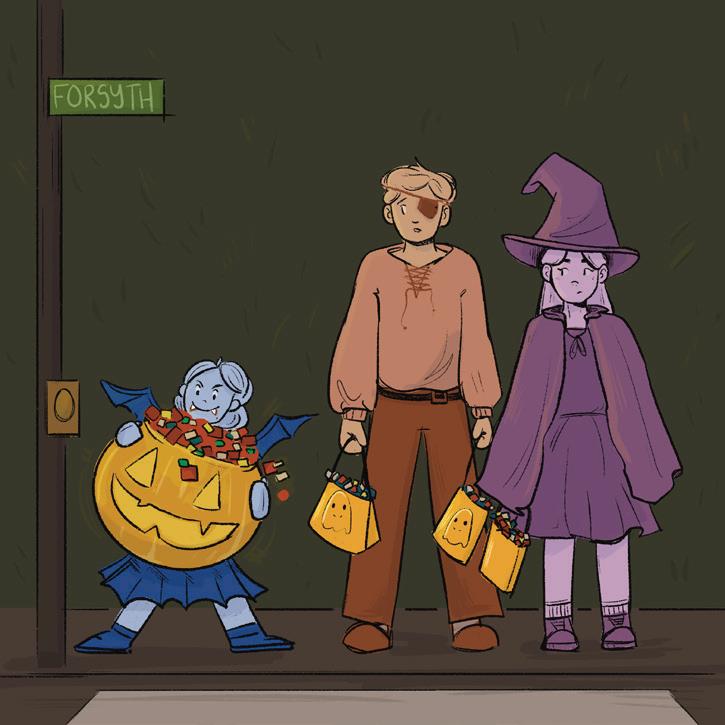
and cheap attacks.
Why does this happen?
Some have posited the site X as the source of this growing toxicity, charting the growing willingness to engage in uncivil posting on the platform. However, the social media website is merely a scapegoat. Around the country, both sides of the political spectrum are filled with hate and disdain for fellow countrymen and their ideas.
A great example of this comes from our own campus. An article published in Student Life (yes, this Student Life) in 2019 titled “It’s OK that conservatives don’t feel welcome” was met with some backlash, prompting the then Editor-in-Chief to write a response defending the article.
“We believe it to be our editorial duty to publish as wide a variety of ideas as are submitted to us whenever possible,” Sam Seekings said in Student Life’s response.
This idea seems noble enough. Yes, diverse voices should be heard on campus. However, if you read the original article, it endorses the exact opposite idea, stating, “Some belief systems are either unnecessary or detrimental to serious discourse … Conservative ideas do not deserve equal consideration
unfortunate that we must face adversity, oppression, and bigotry in order to get motivated to fight for change. However, it also means that our country and close communities can come out better than they were before.
The results of this election do not write the future for us. Staring down the next four years, we must not compromise our standards of democracy, integrity, and respect.
Staff editorials reflect the opinion of the majority of our editorial board members. The editorial board operates independently of our newsroom and includes members of the senior staff.
Alice Gottesman, Managing Scene Editor
Jordan Spector, Senior Forum Editor
Will Rosenblum, Senior Scene Editor
Lore
Jasmine
David
Dion
Forum Editor
Samantha Elegant, Copy Editor
Jaime Hebel, Head of Illustration
Sydney Tran, Head of Design
Bri Nitsberg, Managing Photo Editor
AnaElda Ramos, Illustration Editor
Nina Giraldo, Co-Editor-inChief Avi Holzman, Co-Editor-inChief Mia Burkholder, Chief of Copy
Tim Mellman, Managing Newsletter Editor

to that afforded liberal and left ideas, because conservative ideas are not equal to liberal and left ideas.”
This was written about one of the two prominent political parties in the United States — a political party that roughly half of all Americans support. If you are unwilling to give this party respect and consideration, that speaks a lot to the value put on that “wide variety of ideas.”
Neither side of the political aisle wants civility, they want you to shut up and let them have their way. They don’t respect you. The sooner we all
First Place: Me and my boi and my other boi who is 3 foot 2 inches tall Charlie Fallon, Current WashU Student
Second Place: When you agree to trick-or-treat with your Tinder date and think it’s a cute date idea but find out it’s because they have a kid Oscar Waldman, Current WashU Student
Third Place: Me and my boy on Halloween about to beat the s*** out of a little kid and take his candy Charlie Fallon, Current WashU Student
learn that lesson, the sooner we can be realistic about American politics. Americans don’t want civil debates. Americans want to make fun of Tampon Tim; they want conservatives to feel unwelcome on college campuses. With the picture I’ve just painted, things look pretty bleak, but there is some good news. The way to fix this problem is strong leadership — leadership that chooses not to put members of the opposite political party down. On Monday, Oct. 14, President Joe Biden warned Iran that an assassination attempt against
Trump would be an act of war. Yeah, I’ll admit it’s a low bar for civility in politics, but this is a far cry from his calling the former President a threat to democracy. Perhaps this is the first ray of sunlight cracking through a series of dark storm clouds. Like Congress, we’re in a gridlock. We’re at a boiling point, and it seems we may just boil over. We can’t put a lid on the pot, and the only way to turn down the temperature is if both sides agree to do it in unison. I have hope, but my guard is up.

Scan the QR code to enter your submission by 11:59 p.m. on Monday.

IAN
JACOB
IZZY
Coming off a tournament run to the Sweet 16 of the Division III NCAA tournament, this year feels different for the WashU men’s basketball team.
Last season’s run capped off a year of question marks. The Bears had several key players to replace, dealt with injuries, and battled in conference play, splitting their season series with six of their seven conference teams.
This grit and determination allowed a young team with a veteran head coach, Pat Juckem, to be one of the last 16 teams standing. But like every team except one in the country, the Bears’ season ended in disappointment. The Bears were outmatched in a 21-point loss to the eventual D-III champions, Trine
standing. And this year, more than any year in the recent past, they have the pieces to do it.
“...We lost very few rotational players … and we were one of the best teams in the nation [last year],” senior forward Drake Kindsvater said.
“Our goal has always been to win a national championship. At the end, we lost to Trine, who won the national championship. It proves that we’re right there.”
Entering the season, the Bears are ranked fourth in D-III. Kindsvater and senior guard Hayden Doyle were both named to the preseason All-American Third Team, placing them among the 15 best players in the nation at the Division III level. This star power, along with the squad’s depth and chemistry, will make them a difficult team to beat all season long.
“We don’t talk too much about the rankings, but we do talk about our habits and our mindset and doing things
the clock in the Bears’ secondround victory over Illinois College.
Oliff and Doyle will again make up a dangerous backcourt tandem for the Bears. Both are capable ball-handlers and strong facilitators — last season, the duo were among the Top 5 in the University Athletic Association (UAA) in assists and assists-to-turnover ratios. The two upperclassmen are also above-average rebounders for their size — something Oliff identifies as a strength of the team.
“One of our staples is dominating teams on the glass. That’s such an important thing in basketball: just winning possessions. And rebounding, both offensively and defensively, is something we take a lot of pride in,” he said.
Oliff recorded double-digit rebounds in all three playoff games last year — stepping up big when the team needed him to crash the boards the most. He also played through
broke his nose twice and had surgery to repair the damage. When healthy, Kindsvater averaged team-highs of 16.2 points and 7.1 rebounds in 14 games of action.
Kindsvater, who said his nose was “shattered in seven spots,” spent the offseason working on his three-point shot and attacking the rim. He will likely be joined in the starting lineup by junior forward Will Grudzinski and senior center Calvin Kapral.
However, Kindsvater is hesitant to use position labels to describe the team.
“We have a pretty freeflowing offense,” he said. “It’s positionless basketball.”
WashU is going to need players from up and down the bench to step up if they want to withstand the loss of senior guard Kyle Beedon, who will miss the entire season due to a torn ACL. Beedon, a sharpshooter who entered the starting lineup after Kindsvater’s injury and shot nearly 40% from three-point range last season, provided the Bears with crucial spacing that allowed others to create open looks. Now, the Bears are looking for the next man up.
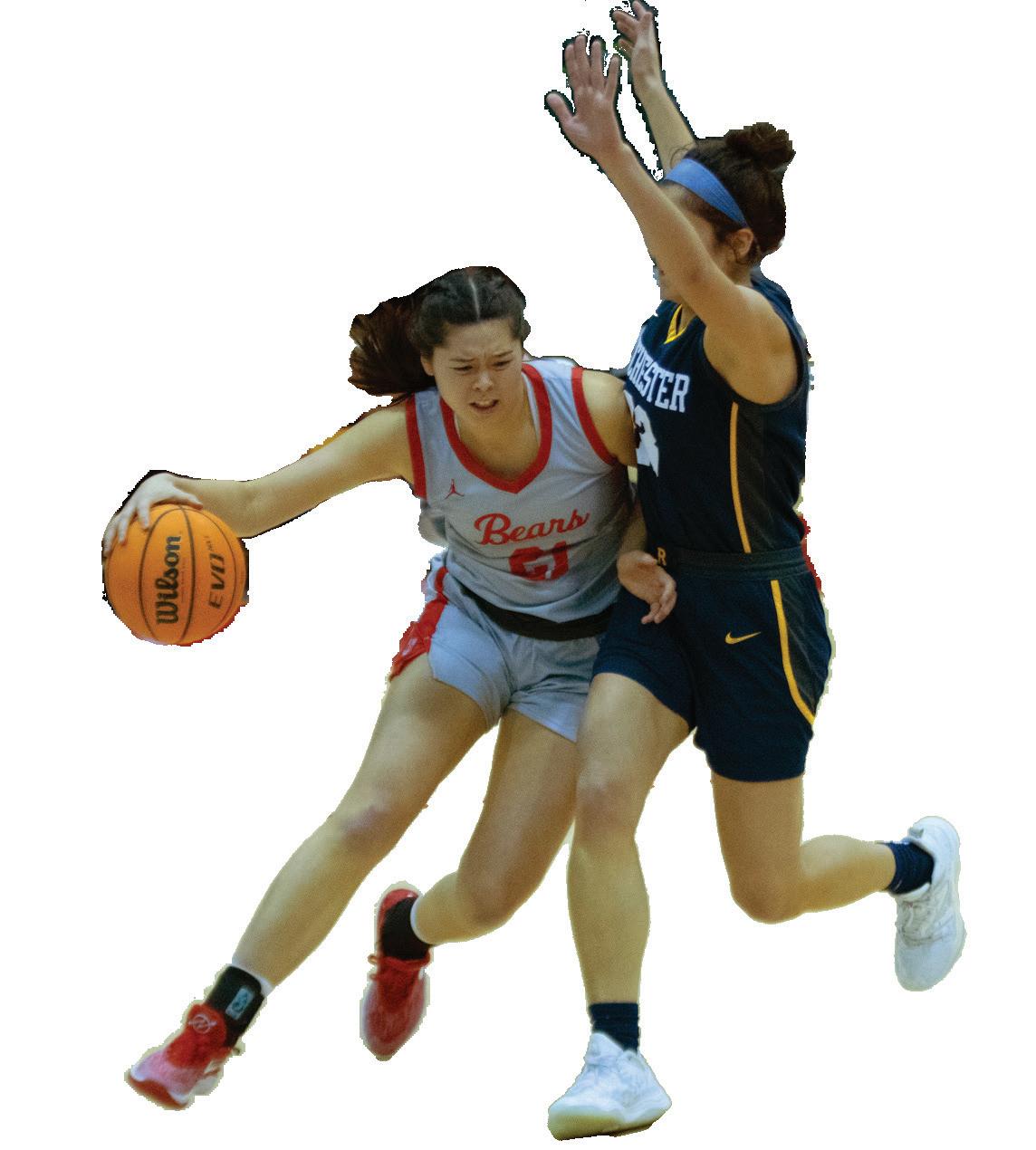
— graduate-student guard Jessica Brooks and sophomore center Lexy Harris — leading a deep lineup, Stone’s program, ranked 18th in the country in the preseason d3hoops.com poll, has the potential to run the table in 2024-25.
When the No. 18 WashU women’s basketball team tips off its season on Nov. 15, it won’t just start a new season for the Bears. It’ll start a new era with coach Lisa Stone at the helm.
In 2023, despite being one of the youngest teams in Division III, WashU finished second in the University Athletic Association (UAA). However, the Bears were eliminated in the first round of the NCAA tournament by the University of WisconsinStout. Randi Henderson, the team’s previous coach, took an assistant coaching job at the University of Iowa over the summer. Stone, who most recently coached Saint Louis University for 10 years, has inherited the 11 top scorers from WashU’s 2023 team. With two preseason All-Americans
With the adjustment to a new coach and style of play, the WashU team will turn to their two captains, Brooks and senior forward Brenna Loftus, to find success this season.
“Jessica Brooks is a key player, very vocal. [We] all look up and feel comfortable with her. [The] other team captain is Brenna Loftus and she … brings the energy in practice,” Harris said.
Brooks made the decision to return to WashU for her fifth year after the Bears lost in the first round of the NCAA tournament last season.
“Our last game, we lost in the first round of the tournament, and I was like, ‘Oh no, there’s no way I’m done.’ I just love this sport, love the team, and love the school way too much,” Brooks said. Last year, Brooks earned
“Obviously, it’s a big loss,” said Doyle, who led last year’s team in total points scored. “Kyle was really playing well, especially towards the end of the year, and we’re gonna miss him a lot.”
But the Bears have a number of sophomores who will have the opportunity to step up in Beedon’s absence. Guard Emmett Lawton contributed key minutes down the stretch, while guard Lucas Vogel has impressed members of the team in practice. Forward
George Gale and center Jake Davis are two frontcourt players with high potential, while guard Ryan Cohen demonstrated some of Beedon’s sharpshooting chops, nailing 41.7% of his threes in limited action last season.
More than anything, the Bears see this year as an opportunity to grow. Last season’s tournament run provided valuable experience to this group of players. They saw firsthand what it takes to be a champion. With the right developments, WashU can bridge the gap that exists between them and the level of play required to be a champion.
“We always refer to the season as a journey, and that journey is filled with so many
moments, and people would think those moments are primarily attached to winning games, and that’s certainly our aspiration,” Juckem said. The journey will begin this Friday, as WashU will take on Rhodes College. The Bears, who are ranked as the top team in the conference in the preseason UAA coaches poll, will begin UAA play on Jan, 11 when they face off against the University of Chicago. Only one team can stand alone at the end of the long season. And the Bears believe that that team can be them. They have good reason to believe it, too. Despite the loss of Beedon, WashU boasts a blend of scoring, size, and length, coupled with new additions ready to contribute, who are led by a veteran coach. Add to that the experience that last year provided, and it’s easy to dream of what this season could become But crucially, the Bears aren’t shifting their focus that far ahead. Instead, they’ll continue to emphasize the importance of each possession and how they can improve each and every play. They hope, and believe, that that is the key to this year’s season.

First Team All-UAA recognition and led the team in points and rebounds per game, averaging 16.6 points and 7.9 rebounds per game. Stone wants to help Brooks continue elevating her game.
“She’s the voice of the program to me, and she’s been nothing but a joy to coach,” Stone said. “But I also want to challenge her. I want to take her to the next level, and she wants that.”
After losing only two seniors from last year’s roster, the Bears will build on the experience of the returners.
Loftus started all 26 games for the team last season, and the team will look to her veteran presence on the court again this winter. Additionally, Harris averaged 16.1 points and 7.4 rebounds per game last season and was named the d3hoops.com National Rookie of the Year as well as the UAA Rookie of the Year.
“Obviously, Lexy’s a returning All-American top player in the country in her position, and she understands that there are things that hopefully we can help her to get even better, and [she can]
continue to go from good to great,” Stone said.
Harris is part of a talented sophomore class. Sophomore point guard Sidney Rogers, who averaged 8.5 points and 3.1 assists per game, is looking to make a significant impact this season after suffering injuries last year.
Rogers will likely be joined in the backcourt by Catherine Goodwin, a sophomore guard who led the Bears with 28.3 minutes played and 3.1 assists per game. Other notable returners include junior forwards Nailah McBeth and Jordan Rich, sophomore guard Alyssa Hughes, and sophomore forwards Amelia Rosin and Sydney Starks. Both Rich and Hughes appeared in all 26 games last season, and Hughes led the team in three-point percentage, shooting .368 from behind the line.
Along with returners, the Bears have welcomed six new first-years to the team.
“I like what I see in that freshman class,” Stone said.
“We’ve got ball-handlers, we’ve got scorers, [we’ve] got great shooters, and there’s a
nice blend and a good mix of various classes throughout my different lineups.”
The Bears will begin non-conference play on Nov. 15 with the Hyatt Place Tournament against Edgewood College in Rock Island, Illinois.
“I think the first game of the year against Edgewood in the Augustana tournament might be the most important, because that’s going to set the stage for the rest of the year, win or lose, whatever. It’s a new era [that] starts then,” Stone said.
WashU will play their first home game on Friday, Nov. 22 in the McWilliams Classic, a tournament that includes Lyon College and No. 17 Transylvania University, last season’s D-III runnersup. The Bears will also host the Midwest Challenge in late November, where they will host the Rose-Hulman Institute of Technology, No. 10 Illinois Wesleyan University, and No. 24 DePauw University.
On Jan. 11, the Bears will open their UAA season in St. Louis against the University
of Chicago. The Bears are one of just two UAA teams ranked in the national Top 25, alongside No. 1 New York University (NYU).
“Honestly, I just really want to beat NYU twice. We’ll play them at home, and then we’ll play them at their place. Definitely want to beat them at home, protect our home court,” Brooks said. However, the team knows every UAA opponent will be tough to beat. “To me, it’s the best league in Division III, top to bottom. And we need to be prepared and build momentum from non-conference into the UAA,” Stone said. As the team gears up for opening tipoff, Stone says she looks up at the program’s five national championships in the Field House every day, and aspires to hang up a sixth. Stone knows that contending for championships is not going to be easy, but she is excited for the journey.
“Sometimes, I get sped up and, because I’m energetic, I want excitement in the gym. But I also want to cherish every moment, and I want our players to know that, too.”
The No. 1 WashU women’s soccer team has a saying:
“Pressure is a privilege.”
Over the last two weeks, the Bears have seen plenty of pressure, taking on their top-two challengers in the highly competitive University Athletic Association (UAA). After a 3-0 win over No. 7 Carnegie Mellon University on Oct. 25, the Bears faced off against No. 15 University of Rochester, ranked second in the conference, with the UAA championship on the line.
In the face of pressure, the Bears excelled once again, beating the Yellowjackets 2-0 to earn their second-straight UAA championship and an automatic bid to the 2024 NCAA tournament. The conference title is the 17th in program history, and the Bears have now won nine of the last 10 conference championships.
The Bears also clinched the UAA’s automatic qualifier to the NCAA tournament. WashU has been ranked as the top team in the nation for the last eight weeks. After a run to the national championship game last season, the Bears are one of the favorites in the NCAA tournament once again.
“The team is pretty excited. [Winning the UAA] is one of our goals we set at the beginning of the season, and it’s just an important step for all the goals we have after it,” sophomore midfielder Sophie Viscovich said. “It was a good team effort … we go one game at a time. We’ve been doing that all season, and glad it worked out in our favor.”
The Bears entered the matchup against Rochester with some history. Last season, the Bears were in a similar setting — undefeated, at the top of Division III, and looking to win a UAA title — when the two teams met.

In that matchup, Rochester became the first team to score on the Bears all season and spoiled their celebrations with a 2-1 defeat.
This year, the Bears came out ready to play, putting Rochester’s backline under stress early on. In the eighth minute, a corner kick from Viscovich found junior Grace Ehlert, who knocked the ball into the back of the net to score her 12th goal of the season and give WashU an early 1-0 lead. Ehlert was named the UAA’s Offensive Player of the Week for the second time this season.
“Each week, set pieces is something we like to focus on a lot, just knowing that everyone needs to understand their role and be ready to follow through with that role on the field,” Viscovich said. “Grace did a great job of knowing where she needed to be, and then just placing that ball to where I trusted her to be and her having a great finish.”
Rochester began to get back into the game. Graduatestudent goalkeeper Sidney Conner was forced to come off her line to deny Claire Grover, one of Rochester’s leading scorers, on a one-onone breakaway in the 23rd minute. A few minutes later,
Conner made a diving save to keep a header out of the net. Conner, who made a season-high four saves in the win, was named the UAA’s Defensive Player of the Week.
“I give credit to Rochester — they came out pretty hard — but I think our defense did a really good job,” Conner said after the match. “We always say that our defense starts with our offense, and so I give credit to our forwards and our midfield for stopping their attack most of the time, and then once they were able to get through, I really trusted my back three.”
WashU came close to doubling their lead with four minutes left in the half when junior Kaci Karl’s header ricocheted off the crossbar. Rochester’s second-team All-UAA goalkeeper Grace
Kuropatkin made six of her career-high nine saves in the first half to keep the scoreline at 1-0 going into halftime.
In the second half, the Bears midfield, led by Karl and Viscovich, controlled possession of the ball in the middle of the pitch, and the potent WashU attack outshot the Yellowjackets 11-1.
“We knew going in it was going to be a 3v3 matchup in the midfield, so just understanding our role and following our mark, making sure it was a one-to-one personal battle for each ball,” Viscovich said. “I think all the midfielders did a great job, and wingers, forwards, coming back and helping us with that as well to get numbers up.”
In the 79th minute, first-year Olivia Clemons

received the ball from fellow first-year Cami Colpitts, muscled her way past a Rochester defender, and beat Kuropatkin for her fifth goal in four games to double the Bears lead. Clemons has been a threat off the bench for the Bears, and her 17 goals in a single season are the most for any WashU player since 1998.
“She just has a good vision of how the game is going and what her gifts can do to help us out. We’ve got a bunch of selfless women that are working really hard and just doing what’s being asked of them, and so I couldn’t be prouder of how we’re handling things right now,” head coach Jim Conlon said.
The Bears defense, led by senior Emma Riley McGahan and graduate student Ally Hackett — both of whom played all 90 minutes — held firm as the clock wound down. When the clock hit zero, the Bears rushed the field to celebrate the conference-clinching win.
The top-ranked Bears have
one more regular season game before the NCAA tournament, where they will likely host first-round games as one of the top seeds. Next weekend, they will travel to take on the University of Chicago, looking to cement an undefeated regular season for the first time since 2018. Though the UAA win is an exciting moment for the Bears, the team’s work is not finished, and the Bears will continue leaning into the pressure as they chase their ultimate goals in the postseason.
“It’s easy to not have any pressure on you and just kind of go through life one step at a time. But in this case, we’re winning and we’re trying to do bigger things, and that obviously puts a little bit of pressure on you when you’re trying to win something that a lot of people want,” Conlon said. “We just try and take the mentality of getting better one day at a time and continuing to grow a little bit.”
